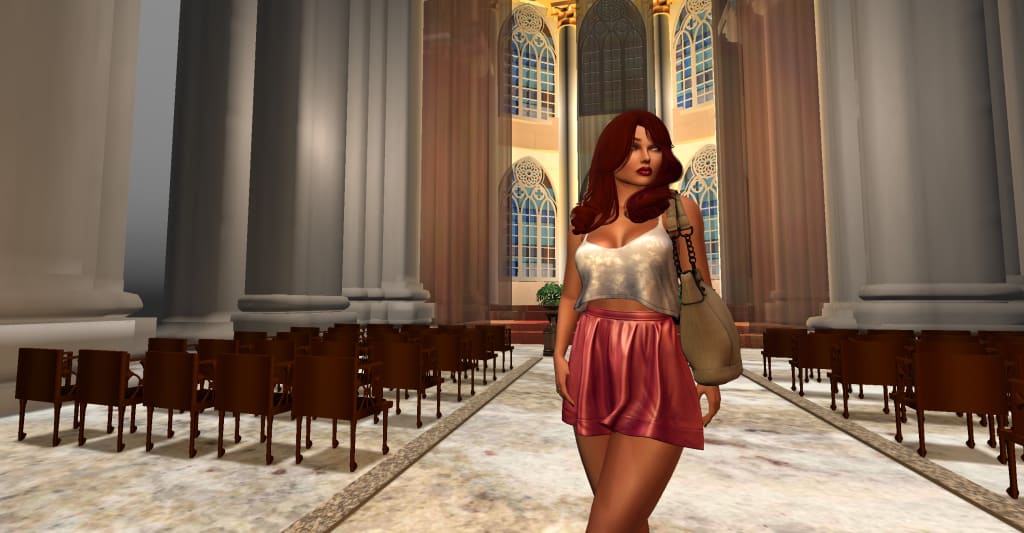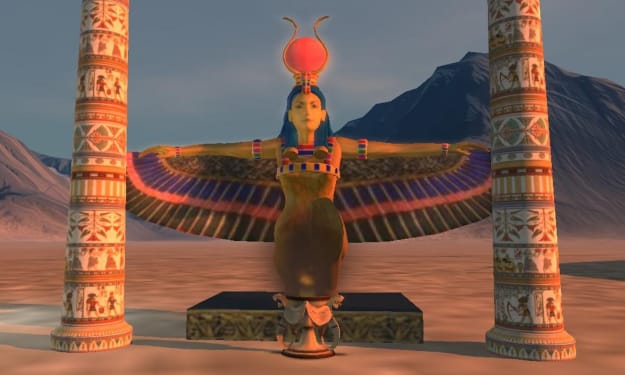Excerpt From the 3rd Book, "To Break Bread with Strangers," The Prologue, "Banquet at Uruk"
At 1988, New York City, Batresh feels the timeline change

She felt a cascade of changing memories.
Like double vision, as if one eye blurred while the other remained clear. Different images of the same event vibrated against each other. The dissonance made her dizzy. Standing alone in the cathedral, looking from the nave to the crossing, she felt it.
She came to St. John the Devine to meet with Karl Echols. Walking to his offices in the crypt below, she tripped over a stone sarcophagus. Recently uncovered, the corner protruded above ground.
He hired her on the spot. She smiled, realizing subtle telepathic messages might have swayed him. She would be the only woman working with the Ensemble for Ancient Music, responsible for making sure props, sets, and costumes arrived in the right building, at the right time. She would be on-tour. She would travel with Denny.
Now walking through the cathedral above, under construction for a century, her heels clicked on polished marble. Looking eastwards towards the altar, she felt vibrations of memories altered, a timeline changed.
She saw images of a voyage she took with the court at 3800 BCE.
She sat down to remember.
It was the inundation, when crops could be neither planted nor harvested. The people gave themselves over to idleness. Canals overflowed, waves lapped against palace walls and villagers grew restless.
Amun used this time to teach the ancestors of builders yet to come, to construct temples, granaries, and government buildings.
Namazu volunteered for her fifth mission.
And, the matriarch made an announcement. It was time to teach the small settlement of humans about the larger world, to establish trade with the only other Tayamni settlement on the planet, the city of Uruk at Sumer.
In communication with Inanna, the Matriarch of Sumer, she planned to journey across the Wadi Hammamat. She would organize tribes into a collective and establish a port city. Then, sailing south on the Reed Sea, they would skirt around the tip of Arabia and travel up to the mouth of the converging Tigris and Euphrates.
Batresh remembered; she stood at an open window with Amun. The palace sat on a rise, looking down on the city. From the second floor, they saw the river below. The journey from Sekhem, across the Wadi and around Arabia, took six months. Arriving at the city gates in the dead of night, they were directed to wait at a temple until permission came from the palace.
No one greeted them.
While waiting, Batresh publicly gave thanks to Ishtar for a safe journey.
The new memory, grew sharper while another, in contrast, faded. She saw blurring images of Queen Inanna and her court all at the river’s edge. Tents and feasts of welcome prepared. Musicians and acrobats performed. However, these images faded.
Sister cities, Sekhem and Uruk were protected by the same Goddess. The temple, near the city gates, sat behind a tall statue of Ishtar on the backs of lions. Ishtar, the Sumerian countenance of Sekhmet, the Lioness.
It would be two days before they met with Inanna. In her memory, standing at the window, she and Amun watched the waters of the Euphrates flow away from the palace. Widening into irrigated fields, it spread into Lake Apsu, its smooth surface dotted with round boats bringing sheep, dates and grain. Miles beyond, the river narrowed, running swiftly towards the Tigris. The two rivers came together as one, at the plains of Eden, a veritable garden of fruit trees, flowering plants and animals.
Lands on each side teamed with farms and merchants, carts and workers carrying grain, artisans trading mats and statuettes.
Sailing up the river, they passed the cities of Ur and Larsam, whose inhabitants thronged at the river’s edge to watch them pass. Their vessels with copper adornments and silken sails glistened. She wondered that the people here were poor, but the land dark and rich. Men coming to the river’s edge were hairy. Their heads shaved, their bodies poor and dirty.
What a sight the Sekhem court must have seemed, sparkling jewels, oiled skin and burnished gold, their bracelets flashing in sunlight.
It was the first time she had traveled such a long distance over land.
Through a fog, she remembered images of a prosperous people coming to the river’s edge, clean and shaven from head to toe.
The Sekhem court brought nobles, priestesses, and 20 merchants. Their caravan of camels carried supplies and dismantled boats.
Older memories of banquets held every evening, the Queen begging them to stay contrasted with new memories of only one banquet. Messages from the Queen were now cryptic. Inanna more reserved, maintained an elevated status, imperious and vain. She kept humans at a cool distance, calling her servants, Adamu, the ancient term for worker.
Standing at the window, Batresh heard footsteps, she turned back towards the darkened room. Amun remained focused on the river. Two male servants entered the hall ahead of their Queen. Eyeliner and face powder marked them as palace workers.
Queen Inanna, the Matriarch of the Tayamni mission at Sumer, was dressed splendidly. Unlike her subjects, she and her entourage of Tayamni were clean, perfumed, elegantly dressed. Inanna wore an elaborate crown. Like the antlers of a hart, golden spears circled around and above her head. Light from a hundred sconces glistened on her jewels.
The Queen glided to a position on the opposite side of the table. She looked at Batresh expectantly, as if waiting for something. Batresh nodded, dipping into a deep, submissive curtsy. “Rumors of your beauty fall short.”
Courtesans and nobles entered from openings at either end of the hall.
Batresh felt Inanna’s emotions. She was fearful, insecure, competitive. Inanna looked expectantly towards Amun, who turned around to face her. Then, Batresh felt it. A tingling, even in the new memory, a shiver on the back of her neck, a feeling as if something changed as they stood there. Amun felt it too. He looked at his wife, then back towards Inanna. Batresh felt him block Inanna from reading his thoughts. He simply nodded and smiled falsely.
Five Tayamni were with the Queen. They too exhibited insecurity. Batresh felt the court was threatened.
Following behind Queen Inanna’s train of courtiers, was Batresh’s Matriarch, the Vizier and Raia. The Matriarch, uncharacteristically cool and aloof, was taller and thinner than Batresh remembered. She cast a glance towards Batresh and Amun, sending them a guarded message, “Do nothing, do not challenge them.” A servant struck a rounded drum from across the room, and they all sat.
Queen Inanna clapped her hands, and humans began to leave. As they walked towards the exits, Batresh looked around with confusion. The Matriarch’s face expressionless, unreadable, blocked every attempt to read her thoughts.
The humans they brought from Sekhem remained and took their seats.
Queen Inanna saw from Batresh’s face, she was confused by the Sumerians’ exit. “We have an ancient proscription against dining with foreigners,” she stated flatly. “We do not break bread with strangers.”
Batresh simply raised her eyebrows.
Inanna continued, “Since you are unknown to the Adamu, you are unclean.”
Amun sent Batresh a telepathic message, “Careful, my love. They are not Tayamni.”
Batresh felt her chest tighten. She watched as servants brought platters and goblets to the table. She looked at the Queen and ventured, “May our court remain and dine with us? We have no such proscription.”
The Queen looked at Batresh as if she were a disobedient child who must be disciplined, “Of course,” she began, looking around the table. She raised her voice to be sure that everyone could hear. “The unclean have no such traditions.” She swallowed, looking around the table fearfully, and began again, “The court of Ishtar is immune to corruption. We may mingle with the unclean and remain unblemished.”
Platters of meats, bread and fruit were brought. Servants carrying ornamented amphorae, poured wine into goblets.
Amun sent another message to Batresh, “Tread carefully, my wife. The timeline has changed. The Potacas are here.”
Originally posted on Scriggler
Excerpt from the 3rd book, "To Break Bread with Strangers," available at Inkitt
About the Creator
Teresa McLaughlin
Former opera singer, singer/songwriter, computer programmer, and cyber security professional, currently writing the science fiction series, "The Love of the Tayamni." Living in the NW with my husband, Miss Vicki, and 2 kitty kats.






Comments
There are no comments for this story
Be the first to respond and start the conversation.